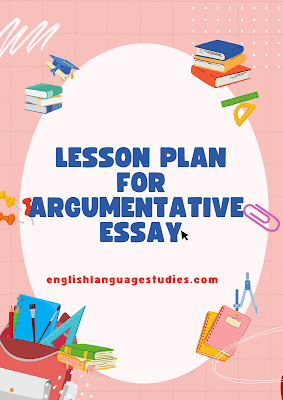Empowering Students to Think Critically & Persuade Effectively
Grade Level: 8–12
Duration: 3–4 Class Periods (45–60 minutes each)
Subject: English Language Arts
Focus: Argumentative Essay Writing
Objectives:
By the end of this lesson, students will be able to:
- Understand the structure and purpose of an argumentative essay
- Develop a clear thesis statement and support it with logical reasoning and evidence
- Differentiate between argument, opinion, and fact
- Anticipate and refute counterarguments
- Write and revise a well-organized argumentative essay
Materials Needed:
- Projector or whiteboard
- Example argumentative essays
- Debate topic cards
- Graphic organizers (claim, evidence, counterclaim chart)
- Peer review checklist
- Rubric for assessment
Lesson Breakdown
Day 1: Introduction to Argumentative Essays
Hook:
Pose a controversial statement (e.g., “School uniforms should be mandatory.”) and ask students to stand on the side they agree with. Quick 5-minute class debate.
Mini-Lecture:
Explain the purpose of argumentative writing. Emphasize structure:
- Introduction (hook + thesis)
- Body Paragraphs (claims + evidence)
- Counterargument & Rebuttal
- Conclusion
Key Concepts Covered:
- Fact vs. Opinion
- Argument vs. Persuasion
- Importance of credible evidence
Day 2: Building Arguments
Step 1: Analyze a Sample Essay
Use a model essay and annotate it as a class:
- Highlight claim, support, counterclaim, rebuttal, and conclusion.
- Discuss what makes the argument strong or weak.
Step 2: Topic Selection & Brainstorming
Students pick from a list of topics or propose their own. Use a graphic organizer to map:
- Thesis statement
- Three supporting arguments
- Evidence for each
- Potential counterargument and rebuttal
Day 3: Writing the First Draft
Students begin writing their argumentative essays in class:
- Paragraph 1: Introduction with hook and thesis
- Paragraphs 2–4: Body (claims + evidence)
- Paragraph 5: Counterclaim and rebuttal
- Paragraph 6: Conclusion
Encourage use of transition words and formal tone.
Day 4: Peer Review & Final Revision
Peer Review Activity:
Use a structured checklist to provide feedback on clarity, logic, evidence, and flow. Swap papers and review.
Revision:
Students revise their work based on feedback and teacher comments.
Assessment:
Final essays graded using a rubric that evaluates:
- Clarity of thesis
- Logical structure and coherence
- Use of evidence
- Counterargument and rebuttal
- Grammar and mechanics
Extension Activities:
- Hold a mini-debate based on student essays.
- Turn essays into video presentations or podcasts.
- Create posters or infographics based on essay arguments.
Conclusion:
Argumentative essay writing isn’t just about winning an argument—it’s about forming thoughtful opinions and backing them up with logic and evidence. This lesson plan ensures students are ready to take on real-world discourse with confidence.
Lesson Plan: Nouns for A1 and A2 Levels
Lesson Plan: Pronouns for A1 and A2 Levels
